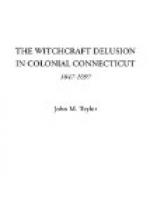In the same year, having paid the expenses of her trials and imprisonment, she removed to Westchester, New York. Being under suspicion of witchcraft, her presence was unwelcome to the inhabitants there and complaint was made to Governor Lovelace. She gave security for her civil carriage and good behavior, and at the General Court of Assizes held in New York in October, 1670, in the case of Katherine Harrison, widow, who was bound to the good behavior upon complaint of some of the inhabitants of Westchester, it was ordered, “that in regard there is nothing appears against her deserving the continuance of that obligation she is to be released from it, & hath liberty to remain in the town of Westchester where she now resides, or anywhere else in the government during her pleasure.”
CHAPTER VII
“Although our fathers cannot be charged with having regarded the Devil in his respectful and deferential light, it must be acknowledged, that they gave him a conspicuous and distinguished—we might almost say a dignified—agency in the affairs of life and the government of the world: they were prone to confess, if not to revere, his presence, in all scenes and at all times. He occupied a wide space, not merely in their theology and philosophy, but in their daily and familiar thoughts.” UPHAM’S Salem Witchcraft.
“There are in every community those who for one cause or another unfortunately incur the dislike and suspicion of the neighbors, and when belief in witchcraft prevailed such persons were easily believed to have familiarity with the evil one.” A Case of Witchcraft in Hartford (Connecticut Magazine, November, 1899), HOADLEY.
Witchcraft in the Connecticut towns reached its climax in 1692—the fateful year at Salem, Massachusetts—and the chief center of its activity was in the border settlements at Fairfield. There, several women early in the year were accused of the crime, and among them Mercy Disborough. The testimonies against her were unique, and yet so typical that they are given in part as the second illustration.
MERCY (DISBRO) DISBOROUGH
A special court, presided over by Robert Treat, Governor, was held at Fairfield by order of the General Court, to try the witch cases, and September 14, 1692, a true bill was exhibited against Mercy Disborough, wife of Thomas Disborough of Compo in Fairfield, in these words:
“Mercy Disborough is complayned of & accused as guilty of witchcraft for that on the 25t of Aprill 1692 & in the 4th year of their Maties reigne & at sundry other times she hath by the instigation & help of the diuill in a preternaturall way afflicted & don harme to the bodyes & estates of sundry of their Maties subjects or to some of them contrary to the law of God, the peace of our soueraigne lord & lady the King & Queen their crowne & dignity.”




